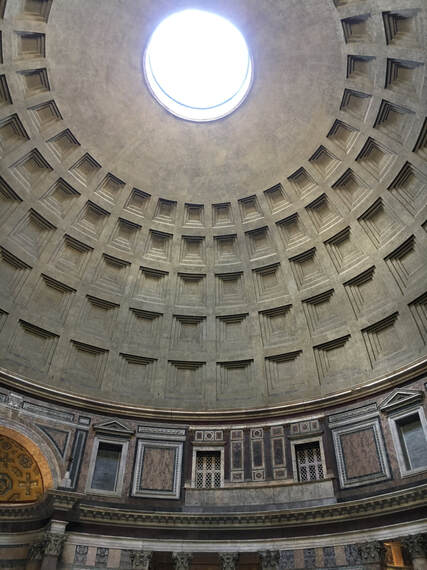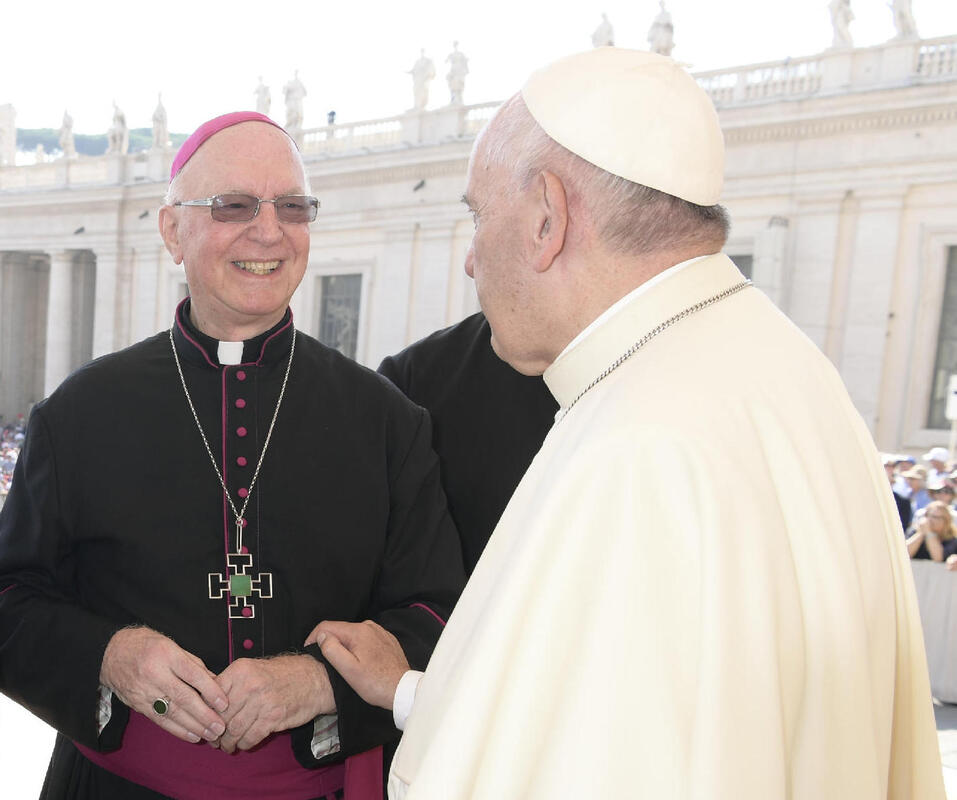|
Read the latest Ordinariate Newsletter, Vol. 1., Issue 1., by clicking on the link to the PDF below:
Decree of the Apostolic Penitentiary on the granting of special Indulgences to the faithful in the current pandemic, 20.03.2020
The gift of special Indulgences is granted to the faithful suffering from COVID-19 disease, commonly known as Coronavirus, as well as to health care workers, family members and all those who in any capacity, including through prayer, care for them. “Be joyful in hope, patient in affliction, faithful in prayer” (Rom 12: 12). The words written by Saint Paul to the Church of Rome resonate throughout the entire history of the Church and guide the judgment of the faithful in the face of all suffering, sickness and calamity. The present moment in which the whole of humanity, threatened by an invisible and insidious disease, which for some time now has become part of all our lives, is marked day after day by anguished fears, new uncertainties and above all widespread physical and moral suffering. The Church, following the example of her Divine Master, has always had the care of the sick at heart. As Saint John Paul II points out, the value of human suffering is twofold: “It is supernatural because it is rooted in the divine mystery of the Redemption of the world, and it is likewise deeply human, because in it the person discovers himself, his own humanity, his own dignity, his own mission” (Apostolic Letter Salvifici Doloris, 31). Pope Francis, too, in these recent days, has shown his paternal closeness and renewed his invitation to pray incessantly for those who are sick with the Coronavirus. So that all those who suffer because of COVID-19, precisely in the mystery of this suffering, may rediscover “the same redemptive suffering of Christ” (ibid., 30), this Apostolic Penitentiary, ex auctoritate Summi Pontificis, trusting in the word of Christ the Lord and considering with a spirit of faith the epidemic currently underway, to be lived in a spirit of personal conversion, grants the gift of Indulgences in accordance with the following disposition. The Plenary Indulgence is granted to the faithful suffering from Coronavirus, who are subject to quarantine by order of the health authority in hospitals or in their own homes if, with a spirit detached from any sin, they unite spiritually through the media to the celebration of Holy Mass, the recitation of the Holy Rosary, to the pious practice of the Way of the Cross or other forms of devotion, or if at least they will recite the Creed, the Lord's Prayer and a pious invocation to the Blessed Virgin Mary, offering this trial in a spirit of faith in God and charity towards their brothers and sisters, with the will to fulfil the usual conditions (sacramental confession, Eucharistic communion and prayer according to the Holy Father's intentions), as soon as possible. Health care workers, family members and all those who, following the example of the Good Samaritan, exposing themselves to the risk of contagion, care for the sick of Coronavirus according to the words of the divine Redeemer: “Greater love has no one than this: to lay down one’s life for one’s friends” (Jn 15: 13), will obtain the same gift of the Plenary Indulgence under the same conditions. This Apostolic Penitentiary also willingly grants a Plenary Indulgence under the same conditions on the occasion of the current world epidemic, also to those faithful who offer a visit to the Blessed Sacrament, or Eucharistic adoration, or reading the Holy Scriptures for at least half an hour, or the recitation of the Holy Rosary, or the pious exercise of the Way of the Cross, or the recitation of the Chaplet of Divine Mercy, to implore from Almighty God the end of the epidemic, relief for those who are afflicted and eternal salvation for those whom the Lord has called to Himself. The Church prays for those who find themselves unable to receive the Sacrament of the Anointing of the Sick and of the Viaticum, entrusting each and every one to divine Mercy by virtue of the communion of saints and granting the faithful a Plenary Indulgence on the point of death, provided that they are duly disposed and have recited a few prayers during their lifetime (in this case the Church makes up for the three usual conditions required). For the attainment of this indulgence the use of the crucifix or the cross is recommended (cf. Enchiridion indulgentiarum, no.12). May the Blessed Virgin Mary, Mother of God and of the Church, Health of the Sick and Help of Christians, our Advocate, help suffering humanity, saving us from the evil of this pandemic and obtaining for us every good necessary for our salvation and sanctification. The present Decree is valid notwithstanding any provision to the contrary. Given in Rome, from the seat of the Apostolic Penitentiary, on 19 March 2020. Mauro Cardinal Piacenza Major Penitentiary Krzysztof Nykiel Regent  On the evening of Easter Day, the disciples were gathered together behind closed doors for fear of the Jewish leadership. Jesus appeared to them, extended his peace to them, breathed on them and commissioned them to exercise his authority in the Church through the ability to forgive sins. The apostles were charged with seeing the boundaries of the Faith revealed through Jesus (Jn 20:23). Saint Matthew tells us that before he ascended into heaven, Jesus gathered the eleven apostles on a mountain where he gave them authority to make disciples of all nations, baptising them in the name of the Father, Son and Holy Spirit. Baptism is therefore the common experience of all members of the Church, irrespective of where that sacrament was administered. In baptism the door to the One, Holy, Catholic and Apostolic Church is opened to us. “Baptism can come only from her from the Jerusalem that is above, our new mother. In baptism the universal church precedes and creates the local church.” (Joseph Ratzinger, 2014 ‘The Local Church and the Universal Church, America, the Jesuit Review). Pope Emeritus Benedict XVI wrote this in response to Cardinal Kasper’s criticism of a document, written in 1992, addressing the relationship between the Universal Church and Local Churches. The Catholic Church is made up of Twenty-Four local churches. In the West there is the Latin Rite Church (of which the Ordinariate is a member), and in the East there are Twenty-Three smaller Eastern Catholic Churches. All Twenty-Four Churches are in communion with the Bishop of Rome, and so are in communion with each other. In modern times, due to migration, Eastern Churches such as the Maronites, Melkites, Ukrainian Greek Catholics, Chaldeans and Syro-Malabars have members in Australia. The question that the Catholic Church faces is whether the Catholic Church is merely a loose federation of Local Churches, each of which can develop what it sees as locally appropriate ‘policies and practices’ or is it a unitary body, whose teaching is universal, and to be applied in every local church? The Church's teaching has always been that the Church Fathers saw the Church as a greater Israel, now become universal. In the image of Jesus as the Bridegroom and the Church as the Bride, the two have become one so God will be all in all. There is only one bride, not a harem. Like a body, the Church has many organs, but as St Paul points out, each organ is essential, but if they do not function in harmony with each other, the body cannot function effectively. “Variety becomes richness only through the process of unification” (Ratzinger; 2014 opus cit.). The Church in Africa, Asia, South America, Australia and throughout the world is both local and universal at the same time. Step into a Catholic Church overseas and you will find a community that reflects the local culture and history. The way the faith is expressed will be coloured by local traditions. Yet at the same time, each local church celebrates the same sacraments as churches the world over, and receives the same teaching and same dogma. In his article, ‘We must resist a very bad idea emerging from the German Church,’ Catholic Herald, March 26, 2015, Fr Lucie-Smith reflects on his time in Africa. He says that our local understanding of the Church is God’s way of mediating to us the universal values of salvation. In East Africa female genital mutilation is common, as are trial marriages which must produce a male child before a marriage becomes absolute. The Catholic Church cannot condone local practices that diminish the value of sexuality, women and children. He goes on to say; “The relationship between local churches and the universal church is a symbiotic union that enriches both. Being in communion with the Holy Father and the other local churches remains a safeguard against local decisions and customs becoming normal in a local church, if those customs are not viewed through the prism of the Catholic faith that has been revealed to us and the universal nature of morality.” If the unity of the Church is to be preserved, no allowance can be made for the view that “this is our way of doing things, and we don’t care about what others do in other countries.” This is the bad idea emerging from the German Church. Those of us who are former Anglicans have witnessed the implosion of the Canterbury Communion precisely for this reason. The ploy of Anglicans to identify “core” issues and “non-core” issues of the Faith and allow local variants on non-core issues which are determined locally because there is no central teaching authority, has contributed to the divisions it is suffering. In a recent address at a Book Launch, Bishop Richard Umbers said that “Ecclesiology - theological study and reflection on the nature and structure of the Church - is likely to be one of the major issues under debate in the forthcoming Plenary Council later this year.” I go further and say that it must be debated or else a great deal of effort and money expended on the Plenary will be wasted. Some submissions from parishes forwarded to the Plenary Council following the Discussion Phase last year indicate that some Catholic clergy and laity in Australia hold views that are incompatible with the Catholic Faith as expressed in the Catechism of the Catholic Church. They view the Church’s teaching as being 'outmoded' and/or 'outdated'. They urge the Church to ‘modernise’ itself in order to be relevant to a world that has written God out of its thinking. They have adopted a Protestant ecclesiology rather than a Catholic one. They demand that the Universal Church adopts their views and applies them universally. If that is refused, they demand that each Local Church can do what it wants, so destroying the unity of the Church. Those attending the Plenary Council must be aware of this underlying agenda and approach the discussions asking themselves the question, “Is the Universal Catholic Church a unity of local churches or a federation of independent local churches?” The answer to that question will determine the future of the the symbolic relationship between the Universal and Local Church in Australia. In Christ, Monsignor Harry Ordinary Emeritus
|
Ordinariate Catholic Parish of Saints Ninian & ChadOur Parish News and Events Archives
December 2023
Categories |
||||||||||||||


 RSS Feed
RSS Feed